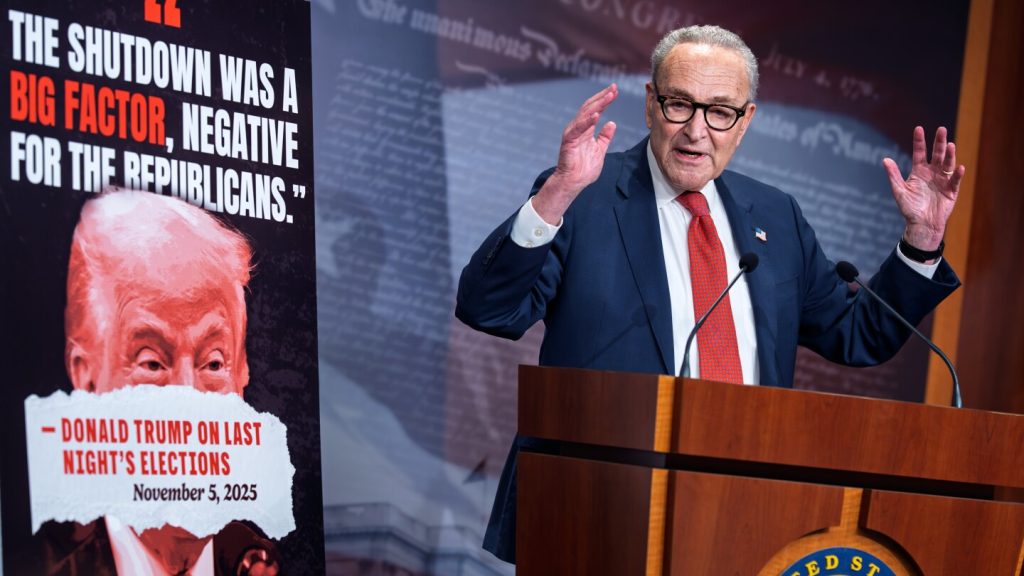Listen to the article
Election Results Complicate Path to Ending Record-Breaking Government Shutdown
Recent election victories for Democrats have intensified the ongoing standoff over the government shutdown, now stretching into its 37th day and setting a new record as the longest in American history.
President Donald Trump, alarmed by Republican losses across the country, called the shutdown a “big factor, negative” in the GOP’s poor electoral performance. Despite this acknowledgment, the president has refused to meet with Democratic leaders, insisting they must reopen the government before any negotiations can take place.
Instead of working directly with Democrats, Trump has increasingly focused on pressuring Senate Republicans to eliminate the 60-vote filibuster threshold that would allow legislation to pass with a simple majority. “This is much bigger than the shutdown,” Trump declared in a Wednesday evening video statement. “This is the survival of our country.” Many GOP senators, however, firmly reject this approach.
Democrats view their decisive gubernatorial victories in Virginia and New Jersey as vindication of their strategy to keep government closed until expiring health care subsidies are addressed. “It would be very strange for the American people to have weighed in, in support of Democrats standing up and fighting for them, and within days for us to surrender without having achieved any of the things that we’ve been fighting for,” said Sen. Chris Murphy, D-Conn.
Progressive advocacy organizations have reinforced this stance. Katie Bethell, political director of MoveOn, warned that “moderate Senate Democrats who are looking for an off ramp right now are completely missing the moment,” adding that “voters have sent a resounding message: We want leaders who fight for us.”
The shutdown’s consequences continue to mount. The Federal Aviation Administration announced plans to reduce air traffic by 10% across 40 high-volume markets beginning Friday morning due to staffing shortages. Millions of Americans have already been affected by suspended government programs and missed federal paychecks, with another payday approaching next week.
Some Senate Democrats maintain they must secure guarantees on extending the Affordable Care Act subsidies before ending the shutdown. Sen. Bernie Sanders, a leading progressive voice, insisted Democrats “have got to remain strong” and should obtain “a commitment from the speaker of the House that he will support the legislation, and that the president will sign.”
Nevertheless, a bipartisan group of centrist senators has been working behind the scenes to negotiate an end to the impasse. Sen. John Hickenlooper, D-Colo., said the election results hadn’t changed his position: “I still feel I want to get out of the shutdown.”
Republicans are increasingly concerned about political damage. “Polls show that most voters blame Republicans more than Democrats,” acknowledged Sen. Josh Hawley, R-Mo. “That’s understandable given who controls the levers of power.”
Trump’s hands-off approach to this shutdown marks a significant departure from his first term, when he actively engaged with congressional leaders during a 35-day closure over border wall funding in 2018-2019. House Speaker Mike Johnson, R-La., has similarly disengaged, sending lawmakers home in September after they approved their own funding bill and refusing further negotiations.
The shutdown has severely disrupted essential services including food assistance programs, child care funding, and numerous other government functions. Hundreds of thousands of federal workers have been furloughed or required to work without pay.
Any resolution will require agreements that must be upheld by the Senate, House, and White House—a challenging prospect in Washington’s current political climate. Senators from both parties, particularly those on the Appropriations Committee, are pushing to restore normal government funding processes.
Perhaps most urgent is addressing the expiring Affordable Care Act subsidies. Millions of Americans are receiving notices of skyrocketing premiums as enhanced federal subsidies, implemented during the COVID-19 pandemic, are set to expire at year’s end. Without these tax credits, many will likely be unable to afford health insurance.
As the standoff continues, the human and economic costs of the shutdown mount daily, with no clear end in sight.
Fact Checker
Verify the accuracy of this article using The Disinformation Commission analysis and real-time sources.




6 Comments
This political standoff seems quite complex. I’m curious to see how the Democrats’ election wins influence the government shutdown negotiations and the path forward. It’s an important issue that impacts many industries, including mining and energy.
The Democrats’ election victories seem to have emboldened them in these negotiations. I’m curious to see if they can leverage that momentum to achieve their goals, or if the president will remain steadfast in his demands.
As an investor in mining and energy stocks, I’m closely watching how this political drama unfolds. A prolonged shutdown could disrupt critical supply chains and create uncertainties in the commodities markets.
This is a complex issue with far-reaching implications. I hope the leaders on both sides can put partisan politics aside and find a pragmatic solution that serves the best interests of the country.
Eliminating the filibuster threshold could have far-reaching implications beyond just this shutdown. It’s an interesting proposal, but I wonder about the longer-term consequences for bipartisanship and legislative balance.
The record-breaking length of this government shutdown is concerning. I hope the parties can find a compromise solution soon to reopen the government and provide stability for the economy and businesses.